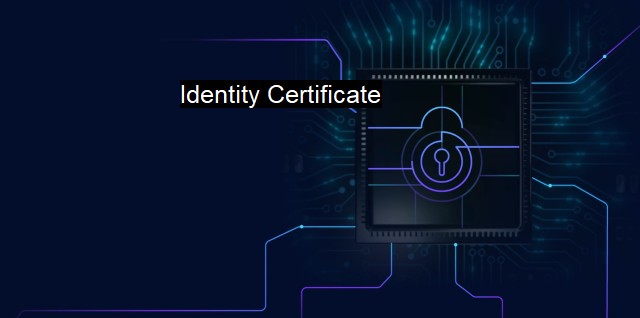What is Identity Certificate?
Understanding Identity Certificates in Cybersecurity and Antivirus Protection
Identity Certificate, often commonly referred to as a digital certificate or SSL certificate plays an imperative role in ensuring and maintaining the security of online data and information. These certificates utilise Public Key Infrastructure (PKI) to ensure network security. It is fundamental and highly significant to the safe and secure conversion of data over the internet. It serves to authenticate the identities of individuals or machines over a digital network and safeguards their transactions and operations over the internet.Issued by credible third-party organizations known as Certificate Authorities (CAs), Identity Certificates function as electronic 'passports'. CAs must undergo thorough examination to earn the status. Subsequently, upon the successful passing of these rigours, they receive the necessary approval to issue Identity Certificates to end entities which include website owners, email, software, or any other entity utilizing SSL encryption.
The Digital Identity Certificates encompass several vital pieces of data, including the certificate holder's name, the certificate's serial number and expiration date, a replica of the certificate holder's public key, and the digital signature of the validating certificate authority. Particular repositories such as LDAP directories have all the details of the issued certificates stored with them.
Identity Certificates broadly serve two main objectives. The first one, encryption, secures data during transmission between a server and a client – or between two servers – by converting, or encrypting, the data into a code that only the intended recipient can read. Hence, these minimize the risk of a hacker intercepting or modifying personal information motioned over the internet.
The second primary function of the Identity Certificate is the authentication, which guarantees the confirmation of the entity on the other end of your connection. This process hinges on the trust and confidence bestowed on the Certificate Authority by your device's operating system and browser. Consequently, only Identity Certificates issued by trusted CAs guarantee a safe and secure exchange of data.
In the context of antivirus programming, Identity Certificates play a significant role in running credibility checks to identify malicious software and websites, consequently, keeping users secure from issues like phishing. With an Identity Certificate, an antivirus program can identify suspicious entities, establishing whether or not data being sent or received is from a legitimate source.
Being in possession of an Identity Certificate in such instances daggers digital trust. This trust not only confirms the legitimacy of software downloads but also assures secure online transactions and agencies, something significant in today’s highly connected digital era. If a system is unsuccessfully unable to verify an Identity Certificate, the communication with the suspicious site is blocked, thereby thwarting any potential online security threats.
Identity certificates are supremely significant in forms of cybersecurity like network security, secure emails, code signing, and document signing. They serve as a reliable layer of defense against data breaches and cyber threats.
Digital traps are abound now more than ever, making it crucial to obtain and use Identity Certificates to safeguard online security. The allocation of these certificates should always be done with due care and only authorize an issued reward from a trusted CA should be accepted.
To sum up, Identity Certificates dovetail an added layer of trust while also delivering a visually validated mark of security to users in the digital world. It asserts the digital identity and protects consumer transactions. Hence, Identity Certificates bear a tremendous responsibility in engendering confidence between parties in the digital world, firmly safeguarding their online interaction from cybersecurity threats.

Identity Certificate FAQs
What is an identity certificate?
An identity certificate is a digital document that verifies the identity of a computer, a user, or an organization. It is typically issued by a trusted third-party entity and contains information such as the name, address, and public key of the certificate holder.Why is an identity certificate important in cybersecurity?
An identity certificate is essential in cybersecurity because it allows users and systems to establish trust in each other's identity. It ensures that the user or organization accessing a particular system or data is who they claim to be and not an imposter or hacker trying to gain unauthorized access.How can I obtain an identity certificate?
You can obtain an identity certificate from a trusted third-party certificate authority (CA). The CA will verify your identity and issue a digital certificate that you can use to authenticate yourself online. You can also generate a self-signed certificate, but it may not be trusted by other systems or users.What is the difference between an identity certificate and an antivirus program?
An identity certificate and an antivirus program serve different purposes in cybersecurity. An identity certificate is used to verify the identity of a user or system, whereas an antivirus program is used to detect, prevent, and remove malware from a computer or network. Both are important in securing digital assets, but they address different aspects of cybersecurity.| | A | | | B | | | C | | | D | | | E | | | F | | | G | | | H | | | I | | | J | | | K | | | L | | | M | |
| | N | | | O | | | P | | | Q | | | R | | | S | | | T | | | U | | | V | | | W | | | X | | | Y | | | Z | |
| | 1 | | | 2 | | | 3 | | | 4 | | | 7 | | | 8 | | |||||||